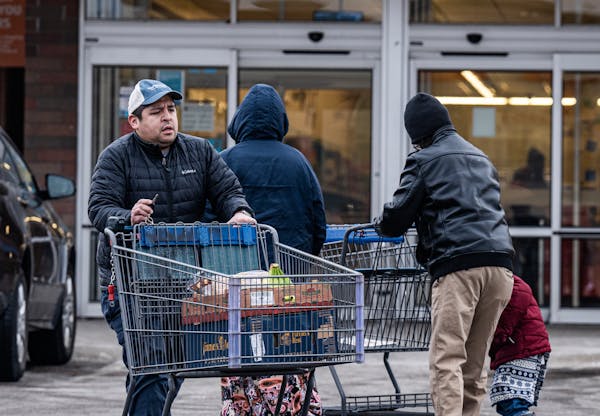For north Minneapolis resident Tasha Powell, it's her great-aunt. That's who she considered when text messages bombarded her phone about a local grocery store's decision to leave north Minneapolis this week.
Her great-aunt loves to walk, and the Aldi off Penn Avenue sat about a block from the 78-year-old's home.
It was not only an extension of her independence but a portal for her connection to her community.
Powell would sometimes see her great-aunt at the grocery store, which announced its abrupt closing this week, and they'd talk and check on one another.
"Losing a grocery store in the community that's already short grocery stores … we are all human, we all have to eat, we all have to feed ourselves to live," said Powell, co-founder and president of Appetite For Change, the West Broadway community nonprofit that uses food for the social good, according to its website. "More importantly, affordability. And that's what Aldi was in this community."
The closing of Aldi in a key location for Black and impoverished Minneapolis neighborhoods, where residents had easy access to affordable nourishment by foot, bus or car, is another disastrous decision for a community that's often assessed according to its challenges and rarely promoted for its light and positivity.
Those challenges will persist with this decision by a major grocer which, according to City Council Member Jeremiah Ellison and building owner David Wellington, did not offer local officials advance notice or an opportunity to create temporary or permanent solutions, choosing instead to force residents to find other, often more costly, places to get their food. That move will create more logistical, social, economic and health disparities for the people who live there, too.
The crime, violence and other problems will be blamed and highlighted in the conversation about this decision, while the seeds of scarcity and their offspring will be proverbially buried deep in the ground where Minnesotans will not have to acknowledge them. That's the formula here. Attack the problem, ignore the cause.
But the cost of poverty is immense. It's not just food insecurity and financial gaps. It's death. Per the Poor People's Campaign, a national organization that works to address socioeconomic disparities, more than 250,000 Americans die each year as a result of those inequities. When it comes to food deserts like the one in north Minneapolis, it's important to note that more than $160 billion in health care costs are attached to hunger in this country.
"It's all inter-related," said Adrienne Dorn, executive director of the Greater Minneapolis Council of Churches, which operates food programs throughout south Minneapolis. "It's urgent. Obviously, we need long-term, systemic change. We need policy change. But we need to do both. We need to work on the long-term but also, people need to eat today."
That's why this Aldi decision matters. It's not just an inconvenience. For some, it's a death sentence. Every new hurdle, logistical challenge and chasm between residents and their basic needs narrows the road to a healthy life.
The Aldi announcement stated that the chain has other locations within 15 minutes of the one that closed. And that's reasonable for folks of privilege, who have access to a multitude of grocery options. Folks like me.
For a person without those resources, however, it's another trek outside their community.
It's extra time to search for affordable food instead of using those same precious moments to invest in their families, communities, personal lives and whatever gives them joy. It's more stress. And, for some, it will mean more hunger.
I told Powell that I'm angry. She said she's angry, too. But she's also not surprised.
"And it's sad to say, but in this community I was born and raised in, we're kind of used to this," Powell said. "It's not OK, but we're kind of used to things coming into our community and then leaving. Bringing a resource and then striking it out."
Powell's organization teaches north Minneapolis residents the value of learning to grow and produce food and internally meet a community's needs for nourishment.
Last year, Minnesota set a record for the number of visits to local food shelves. And now, another community that, more than any other community, needs access to local grocery stores is scrambling for substitutes.
I asked Powell if it's best to help organizations, such as the one she runs and others that aim to address the food desert in local communities, with a check. I appreciated her response.
"Writing a check is always good," Powell said. "We need checks written for this community. Volunteering, lending your resources. Connecting. Most of us know what we need to solve our issues."
She said her great-aunt will now have to ask a relative with a car to help her get groceries. It's not just food, though. Those walks to her nearby Aldi, where she'd chit-chat with people she knew in the neighborhood, gave her a boost.
Now, whenever she walks, she'll see another sign that few seem to care if her community starves.
"She doesn't take public transportation," Powell said. "She walks a lot of places. So now with Aldi leaving the community, how is she going to be able to make that run to go get some eggs?"
Medcalf: Join us for a conversation with Minnesota author Junauda Petrus
Medcalf: Amid challenging economic times, a reminder about what's really valuable
Medcalf: A community pillar in north Minneapolis celebrates 100 years
![Basketball courts at the new Lifetime Fitness at Southdale Center in Edina, Minn., on Monday, December 2, 2019. ] RENEE JONES SCHNEIDER ¥ renee.j](https://arc.stimg.co/startribunemedia/6RAMR36J56VI6UXLMJJHL4FJIU.jpg?h=91&w=145&fit=crop&bg=999&crop=faces)
Medcalf: Life Time's plans to close Minneapolis, Edina courts deserve pushback


